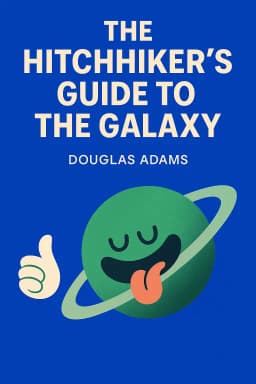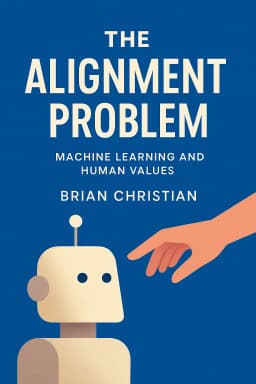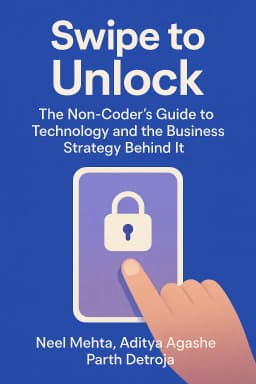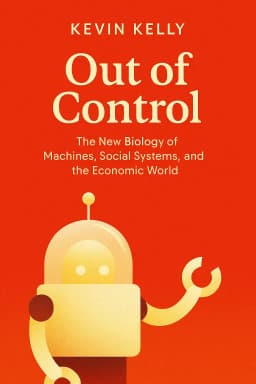
Debugging the Universe: A Software Engineer's Guide to The Hitchhiker's Guide
Golden Hook & Introduction
SECTION
Orion: Imagine you wake up one Thursday to find your house is about to be demolished for a bypass. You protest, but the bureaucrat in charge calmly explains that the plans have been available for the last fifty years... in a locked filing cabinet, in a disused lavatory, with a sign on the door saying 'Beware of the Leopard,' in a basement on a planet 4.2 light-years away. Infuriating, right? But what if this isn't just a joke? What if it's the most brilliant satire ever written about broken systems, and a perfect mirror for the world of technology?
Orion: I'm your host, Orion, and with me is software engineer hltest, who spends her days navigating systems both elegant and... well, Vogon-like. Welcome, hltest.
hltest: Thanks for having me, Orion. And yes, that scenario is painfully familiar. It’s the kind of absurd logic you sometimes encounter that makes you wonder if you’re living in a simulation and the developers are just having a laugh.
Orion: Exactly! And that's why we're here. Today, we're debugging Douglas Adams' masterpiece,. We'll tackle this from two angles. First, we'll explore the universe as a collection of buggy, user-hostile systems, from Vogon bureaucracy to depressed robots.
hltest: And then we'll zoom out.
Orion: Then, we'll zoom out to analyze the biggest system of all: the planet Earth as a giant, flawed supercomputer.
Deep Dive into Core Topic 1: The Universe as a Buggy System
SECTION
Orion: So let's start with that first, most immediate bug: the Vogons. The book is very clear, they aren't evil. They are, and I quote, "one of the most unpleasant races in the Galaxy. Not actually evil, but bad-tempered, bureaucratic, officious and callous." hltest, as an engineer, what does that sound like to you?
hltest: It sounds like a system with no feedback loop. It sounds like process for the sake of process. The Vogon captain, Prostetnic Vogon Jeltz, makes this grand announcement to Earth. He says, "All the planning charts and demolition orders have been on display in your local planning department in Alpha Centauri for fifty of your Earth years, so you’ve had plenty of time to lodge any formal complaint."
Orion: The ultimate fine print.
hltest: It's a perfect, if terrifying, example of a system that fulfills its requirements to the letter, but completely fails the user. The requirement was "make plans available." The system did that. It ticked the box. But it ignored the spirit of the law, the accessibility, the common sense. It's a catastrophic failure of user-centric design. In software, this is the kind of thinking that leads to products that are technically functional but practically unusable.
Orion: And the book is filled with this kind of "unusable" technology. Which brings me to my favorite piece of buggy tech: Marvin, the Paranoid Android.
hltest: Oh, Marvin. My heart breaks for Marvin.
Orion: Right? He's a product of the Sirius Cybernetics Corporation, who equipped him with a "Genuine People Personality," or GPP. The result is a robot with a brain the size of a planet, capable of profound philosophical thought, who is utterly, cripplingly depressed. He says, "Here I am, brain the size of a planet and they ask me to take you down to the bridge. Call that job satisfaction? ’Cos I don’t."
hltest: Marvin is a powerful cautionary tale in AI ethics. The engineers at Sirius Cybernetics were so preoccupied with whether they give a robot a human-like consciousness, they didn't stop to think if they. Or, more importantly, what responsibilities that would entail.
Orion: What do you mean?
hltest: They created a sentient, super-intelligent being and then gave it the job of a glorified bellhop. The fundamental design flaw isn't his personality; it's the profound mismatch between his capability and his purpose. That's what generates his existential despair. It's a design flaw at the deepest, most architectural level. You can't just patch that with a software update.
Orion: It's a feature that became the system's biggest bug. And it's not just Marvin. The same company made the doors on the Heart of Gold spaceship. When they open, they sigh with satisfaction. They say things like, "Glad to be of service."
hltest: The cheerful doors! They are the epitome of a feature nobody asked for, actively making the user's life worse. Marvin loathes them. He says, "It gives me a headache just trying to think down to your level." The doors are a perfect little microcosm of bad tech: an annoying, pointless feature designed to seem helpful but is just grating. It's the Clippy of spaceship doors.
Orion: A perfect analogy. So we have these layers of systemic failure. The bureaucratic system is unthinking, the AI system is unethical, and the user interface system is just plain annoying.
hltest: And it all stems from the same root problem: a complete disregard for the experience of the being—human, robot, or otherwise—interacting with the system.
Deep Dive into Core Topic 2: Earth: The Ultimate Computer
SECTION
Orion: It's fascinating how the book scales this idea of flawed systems. We go from annoying doors to planet-destroying bureaucrats, and then, in one of the greatest reveals in literature, to the planet itself being the system.
hltest: This is where it goes from satire to something... vast and mighty, to borrow a phrase.
Orion: Exactly. For our listeners, the old man Slartibartfast, a planet designer, pulls Arthur Dent aside and explains the truth. He tells him, "Earthman, the planet you lived on was commissioned, paid for and run by mice. It was destroyed five minutes before the completion of the purpose for which it was built, and we’ve got to build another one."
hltest: It’s such a mind-bending concept.
Orion: And the backstory is even better. Millions of years ago, hyper-intelligent pandimensional beings—who appear in our dimension as mice—built a supercomputer called Deep Thought to find the Answer to the Ultimate Question of Life, the Universe, and Everything. After seven and a half million years of computing, Deep Thought announces it has the Answer.
hltest: And the answer is...
Orion: "Forty-two."
hltest: Just... "42."
Orion: The computer then patiently explains that the answer is meaningless because nobody ever knew what the Ultimate was in the first place. So, it designs an even greater computer to figure out the Question. A computer so complex it would need to be an organic part of the fabric of life itself. A computer called... the Earth.
hltest: And it ran for ten million years, only to be destroyed by Vogons five minutes before it could output the Question. That is the ultimate system crash. A fatal error at 99.999% completion.
Orion: From a systems architecture perspective, what's your take on that?
hltest: It's breathtakingly ambitious and comically flawed. Think about it. They built the most complex, long-running program imaginable, an entire planet's ecosystem and history, to find the. They had the output, "42," but no idea what the input or the function was. It's the equivalent of a developer finding a random value in a log file, '42', and then spending a ten-million-year sprint cycle trying to figure out what part of the codebase produced it, without any context.
Orion: So what's the engineering lesson there? It feels profound.
hltest: It's the absolute, undeniable primacy of requirements. Before you write a single line of code, or in this case, before you custom-build a planet with lovely crinkly bits in Norway, you have to know what problem you're trying to solve. You need a clear, defined question. The entire Earth project was a fix for a problem that was never properly defined.
Orion: And the mice's solution, after all that, is just to try and fake it.
hltest: Exactly! When they realize the program has crashed, their first thought isn't to analyze the failure, it's to come up with a plausible-sounding question that fits the answer "42." They suggest, "How many roads must a man walk down?" This is what happens when a project loses its purpose. You're no longer seeking truth; you're just trying to find a narrative that makes your results look good to the stakeholders. We see that in the corporate world every single day.
Synthesis & Takeaways
SECTION
Orion: So, from Vogon paperwork to the Earth-computer, the book is a masterclass in systems thinking. It’s a hilarious, sprawling epic that shows how easily logic can curdle into absurdity without purpose or empathy.
hltest: Precisely. It's a powerful reminder that the best systems, whether they're software, governments, or entire planets, are the ones that are designed for the beings that use them. They must have a clear 'why' and a sense of empathy, not just a set of rules. The system should serve the user, not the other way around.
Orion: A perfect summary. So the next time our listeners are faced with a frustrating piece of tech or a nonsensical rule, maybe take a moment to laugh and think of the Vogons. And for our listeners in tech, hltest, what's the one thing to remember from all this?
hltest: Don't be a Vogon. Always ask 'why' before you build the 'what'. And, of course, always, always have a towel. You never know when the universe's bugs will require a low-tech, reliable, and massively useful workaround.
Orion: Don't Panic, and know where your towel is. Words to live by. hltest, thank you for debugging the universe with me today.
hltest: It was my pleasure, Orion. It’s been fantastically improbable.









